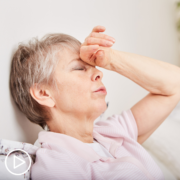Are Beauty Products a Risk Factor for Endometrial Cancer?
Are Beauty Products a Risk Factor for Endometrial Cancer? from Patient Empowerment Network on Vimeo.
Do some beauty products pose a risk factor for endometrial cancer? Expert Dr. Charlotte Gamble from MedStar Health discusses studies that investigated endometrial cancer risk and beauty products that may be a risk factor.
[ACT]IVATION TIP
“If patients have a concern about hair straightener products in general, then maybe it’s time to start avoiding them. But if it’s something that is really important to you and is a crux of who you are as a human being, then I’m not sure we have enough data to say you should absolutely avoid this, and this is contributing to your cancer risk.”
Download Guide | Descargar Guía en Español
See More from [ACT]IVATED Endometrial Cancer
Related Resources:

|

Advancements in Endometrial Cancer Trials | Insights and Opportunities |

|
Transcript:
Lisa Hatfield:
Dr. Gamble, there are often questions around the use of hair products and gynecological cancers. Can you speak to this and whether there are any correlations or risk factors with the use of these hair products?
Dr. Charlotte Gamble:
Absolutely. This is also an area of some controversy, and the data has yet to really be accepted or validated. And it’s, I think, an area that needs so much additional research. So, you know, within the past few years, there have been a few major studies that have looked at patients, looking back at patients who have then developed endometrial cancer and seeing what kind of risk factors they might have had compared to patients who didn’t develop endometrial cancers. And looking at the types of patients within these studies, there are some subtle differences that need to be addressed.
The overall conclusion from these studies was that the frequent use of hair straightener products might increase the risk or is associated, I should say, with a risk of developing uterine or endometrial cancer. But the nuances within how these studies were conducted and which populations they were done in, I think deserves a little bit of detail and insight.
One of the major studies was done in a cohort group of patients who had actually close family members who had breast cancer. And so this is actually a very specific type of patient population where they were already at somewhat of an increased risk of developing a type of a cancer, because they had a relative that had breast cancer. And in this cohort of patients, they found that the frequent use of hair straightener products was associated with a higher likelihood of developing uterine cancer.
The kind of challenges I have with this is not only the patient population looking at it being predominantly groups of folks who already have a relative with a cancer, but then also the cohort itself is predominantly Caucasian or white, with 85 percent being white and a very small percentage of those patients being Black. And it’s hard to actually draw conclusions based on that, again, with just not a great representation of Black women who can be frequent users of hair straightener products.
And then there are nuances of like, what is a hair straightener product? What does that mean? Is that a chemical relaxer? Is that a Brazilian? And how does that actually affect the endometrial cancer risk? And we don’t know. Again, it’s a correlation, an association, but not a causation. The other study was done in a cohort of patients who were Black in the Black Women’s Health Study. And so it was a much better representation of patients that I take care of and are at risk of endometrial cancer. And the challenge with this study was that there are several different nuances and kind of when the cancer occurred and if it was pre-menopausal, before menopause or after menopause and the type of cancers they were. And I think a lot of this data is pretty compelling that there’s probably some degree of an association.
But it’s very difficult to know how that actually relates to the type of cancers that we see most frequently in Black women, which are aggressive, non-hormonally responsive cancers that might not have any sort of risk that’s tied to hair straightener products that generally do a hormonal cascade. So my activation tip for this question is we do not know. The jury is out. There are some initial studies that look at this association and for patients and how they take care of their hair. If patients have a concern about hair straightener products in general, then maybe it’s time to start avoiding them. But if it’s something that is really important to you and is a crux of who you are as a human being, then I’m not sure we have enough data to say you should absolutely avoid this, and this is contributing to your cancer risk.
Share Your Feedback:
Create your own user feedback survey






